| Listing 1 - 10 of 23 | << page >> |
Sort by
|
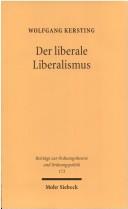
ISBN: 3161490223 9783161490224 Year: 2006 Publisher: Tübingen Mohr Siebeck
Abstract | Keywords | Export | Availability | Bookmark
 Loading...
Loading...Choose an application
- Reference Manager
- EndNote
- RefWorks (Direct export to RefWorks)
Liberalism --- Liberal egalitarianism --- Liberty --- Political science --- Social sciences
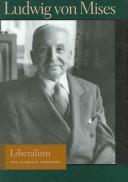
ISBN: 9780865975859 086597585X 9780865975866 0865975868 Year: 2006 Publisher: Indianapolis, Ind.,
Abstract | Keywords | Export | Availability | Bookmark
 Loading...
Loading...Choose an application
- Reference Manager
- EndNote
- RefWorks (Direct export to RefWorks)
Economic schools --- Liberalism --- Economics --- liberalisme (algemeen) --- Liberal egalitarianism --- Economic theory --- Political economy
Book
ISBN: 2246691710 9782246691716 Year: 2006 Volume: *5 Publisher: Paris : Grasset,
Abstract | Keywords | Export | Availability | Bookmark
 Loading...
Loading...Choose an application
- Reference Manager
- EndNote
- RefWorks (Direct export to RefWorks)
BPB0701 --- 329.12 --- Liberale partijen --- 329.12 Liberale partijen --- Liberalism --- Liberal egalitarianism --- Liberty --- Political science --- Social sciences --- Libéralisme
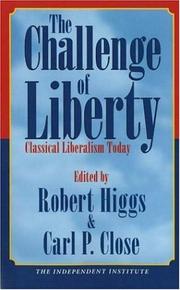
ISBN: 1598130021 9781598130027 1306013550 1598131095 Year: 2006 Publisher: Oakland, Calif. : Iindependent Institute,
Abstract | Keywords | Export | Availability | Bookmark
 Loading...
Loading...Choose an application
- Reference Manager
- EndNote
- RefWorks (Direct export to RefWorks)
The quest for freedom has always been as much a battle of ideas as it is a popular struggle. Classical liberal pioneers such as John Locke and Adam Smith stressed the inherent worth of the individual, inalienable rights, and the benevolent consequences of the cooperative, peaceful pursuit of one's own happiness. These ideas became the intellectual scaffolding for much of the West's most fundamental institutions and achievements. Yet after its 19th-century high-water mark, classical liberalism lost much of its passion, focus, and popular support. Intellectual trends increasingly began to suppor
Liberalism --- Liberty --- Civil liberty --- Emancipation --- Freedom --- Liberation --- Personal liberty --- Liberal egalitarianism --- Liberalism. --- Liberty. --- Democracy --- Natural law --- Political science --- Equality --- Libertarianism --- Social control --- Social sciences

ISBN: 0231137400 9780231137409 Year: 2006 Publisher: New York (N.Y.) Columbia university press
Abstract | Keywords | Export | Availability | Bookmark
 Loading...
Loading...Choose an application
- Reference Manager
- EndNote
- RefWorks (Direct export to RefWorks)
Democracy. --- Liberalism. --- Civil society. --- Civil society --- Democracy --- Liberalism --- Liberal egalitarianism --- Liberty --- Political science --- Social sciences --- Self-government --- Equality --- Representative government and representation --- Republics --- Social contract

ISBN: 0415377447 9780415377447 9780203968710 9781134183883 9781134183920 9781134183937 9780415377454 Year: 2006 Publisher: London Routledge
Abstract | Keywords | Export | Availability | Bookmark
 Loading...
Loading...Choose an application
- Reference Manager
- EndNote
- RefWorks (Direct export to RefWorks)
John Stuart Mill is one of the greatest thinkers of the nineteenth century. But does he have anything to teach us today? His deep concern for freedom of the individual is thought by some to be outdated and inadequate to the cultural and religious complexities of twenty-first century life. In this succinct and shrewd book, John Skorupski argues that Mill is a profound and inspiring social and political thinker from whom we still have much to learn. He reflects on Mill's central arguments in his most famous works, including 'Utilitarianism' ''and 'On Liberty', and traces their implications for democratic politics. With the use of topical and controversial examples, including privacy, religious intolerance, and freedom of speech, he makes Mill's concerns our own at a time when what liberalism means, and why it matters, is once again in dispute. He concludes that Mill's place in the pantheon of "great thinkers" rests not only on his specific political and social doctrines, but above all on his steadfastly generous and liberal vision of human beings, their relations to one another, and what makes life worth living.
Mill, John Stuart --- Liberalism --- Utilitarianism --- Mill, John Stuart, --- Liberalism. --- Utilitarianism. --- Liberal egalitarianism --- Liberty --- Political science --- Social sciences --- Ethics --- Hedonism --- Philosophy --- 穆勒 --- Libéralisme --- Utilitarisme --- Mill, John Stuart, - 1806-1873.
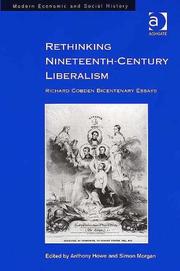
ISBN: 9780754655725 0754655725 9781315244297 9781351903608 9781138259348 Year: 2006 Publisher: Aldershot Ashgate
Abstract | Keywords | Export | Availability | Bookmark
 Loading...
Loading...Choose an application
- Reference Manager
- EndNote
- RefWorks (Direct export to RefWorks)
Liberalism --- Social reformers --- Libéralisme --- Réformateurs sociaux --- History. --- Biography. --- Histoire --- Biographie --- Cobden, Richard, --- Influence. --- Great Britain --- Grande-Bretagne --- Politics and government --- Politique et gouvernement --- Libéralisme --- Réformateurs sociaux --- Liberal egalitarianism --- Liberty --- Political science --- Social sciences --- History --- Biography --- Manchester manufacturer,
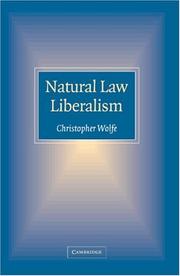
ISBN: 0521842786 9780521842785 9780511509704 9780521140607 0511241631 9780511241635 9780511242366 0511242360 0511240597 9780511240591 0511241119 9780511241116 0511509707 0521140609 1107163544 1280568070 0511318464 Year: 2006 Publisher: Cambridge : Cambridge University Press,
Abstract | Keywords | Export | Availability | Bookmark
 Loading...
Loading...Choose an application
- Reference Manager
- EndNote
- RefWorks (Direct export to RefWorks)
Liberal political philosophy and natural law theory are not contradictory, but - properly understood - mutually reinforcing. Contemporary liberalism (as represented by Rawls, Guttman and Thompson, Dworkin, Raz, and Macedo) rejects natural law and seeks to diminish its historical contribution to the liberal political tradition, but it is only one, defective variant of liberalism. A careful analysis of the history of liberalism, identifying its core principles, and a similar examination of classical natural law theory (as represented by Thomas Aquinas and his intellectual descendants), show that a natural law liberalism is possible and desirable. Natural law theory embraces the key principles of liberalism, and it also provides balance in resisting some of its problematic tendencies. Natural law liberalism is the soundest basis for American public philosophy, and it is a potentially more attractive and persuasive form of liberalism for nations that have tended to resist it.
Liberalism --- Natural law --- Law of nature (Law) --- Natural rights --- Nature, Law of (Law) --- Rights, Natural --- Law --- Liberal egalitarianism --- Liberty --- Political science --- Social sciences --- Liberalism. --- Natural law. --- Social Sciences --- Political Science

ISBN: 0813136997 1283232812 9786613232816 0813171695 9780813171692 0813123682 0813191483 9780813191485 9780813123684 9780813136998 9781283232814 6613232815 Year: 2006 Publisher: Lexington University Press of Kentucky
Abstract | Keywords | Export | Availability | Bookmark
 Loading...
Loading...Choose an application
- Reference Manager
- EndNote
- RefWorks (Direct export to RefWorks)
Founded in 2002, Logos: A Journal of Modern Society and Culture was established in response to the increasing erosion of a left political culture and the new possibilities for international political engagement and cooperation produced by the Internet. Many of the best known intellectual representatives of what might be termed a ""rational radicalism"" soon served as the core group for this new online journal that has reached about four million readers. The Logos Reader brings together the most influential and controversial work to appear in the journal. In its pages, writers of exceptional
Political science. --- Socialism. --- Liberalism. --- Administration --- Civil government --- Commonwealth, The --- Government --- Political theory --- Political thought --- Politics --- Science, Political --- Social sciences --- State, The --- Marxism --- Social democracy --- Socialist movements --- Collectivism --- Anarchism --- Communism --- Critical theory --- Liberal egalitarianism --- Liberty --- Political science

ISBN: 0889208999 9780889208995 0889201277 1554584388 Year: 2006 Publisher: Waterloo, CANADA Wilfrid Laurier University Press
Abstract | Keywords | Export | Availability | Bookmark
 Loading...
Loading...Choose an application
- Reference Manager
- EndNote
- RefWorks (Direct export to RefWorks)
This volume presents a carefully reasoned, rigorous critique of mainline academic psychology. From the professional beginnings of their discipline, contend the authors, American psychologists have made two promises: that psychology would be treated as a natural science and that its application to social—mainly educational—reform would be as effective as that of the more physical sciences to technological change. Underlying these promises is the “liberal consensus,” the belief that social problems are to be solved by improvements in educational methods. Put to the test during the affluence of the 1950s and 1960s—the years of the liberal consensus—these promises were never kept, maintain the authors. Their provocative study provides a variety of reasons why the goal was unattained, and is even unattainable. The book will be of interest to psychologists, sociologists, professional educators, and students of social change.
Psychology --- Liberalism --- Educational psychology --- Behavioral sciences --- Mental philosophy --- Mind --- Science, Mental --- Human biology --- Philosophy --- Soul --- Mental health --- Education --- Liberal egalitarianism --- Liberty --- Political science --- Social sciences --- History --- Methodology. --- United States --- Social conditions
| Listing 1 - 10 of 23 | << page >> |
Sort by
|

 Search
Search Feedback
Feedback About
About Help
Help News
News